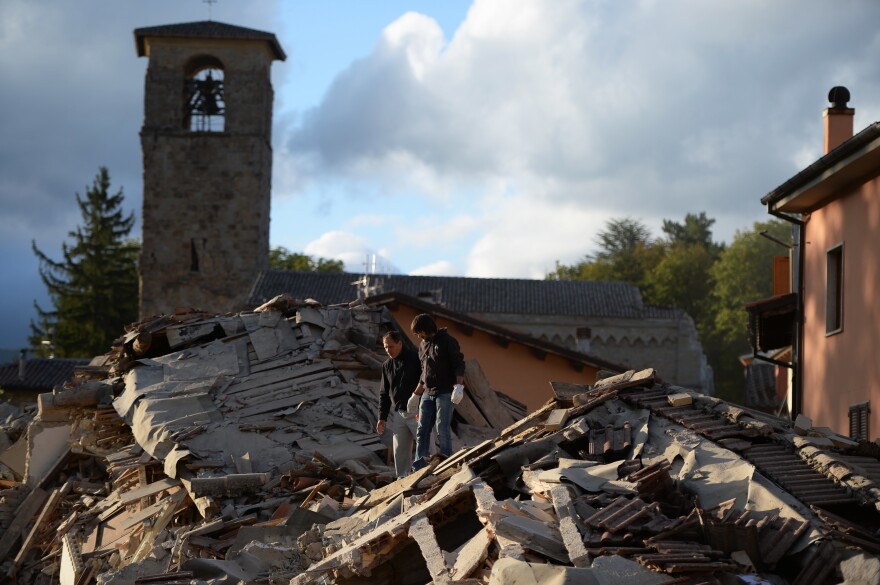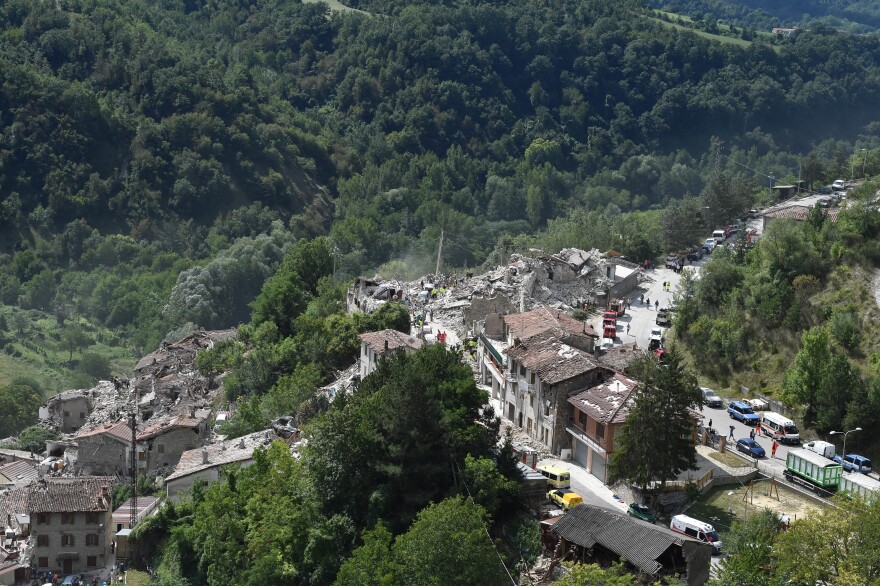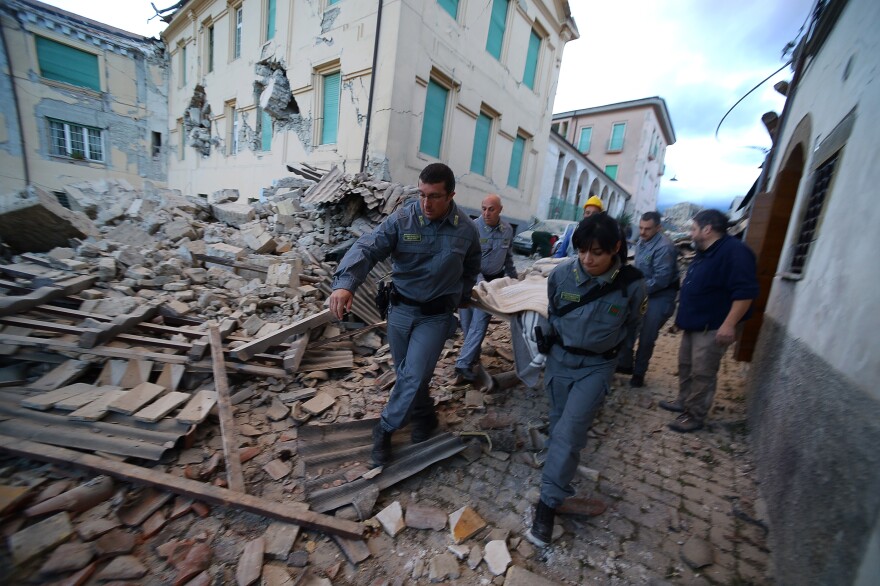Updated at 8 a.m. ET on Thursday:
Officials in Italy say the death toll has risen to 241. The Associated Press quotes the country's civil protection agency — in updated figures about 27 hours after the earthquake struck, the officials said the death toll was 247, but it has since been revised downward. Urgent search efforts continue.
Original Post:
A powerful earthquake shook central Italy overnight on Wednesday, killing more than 150 people, according to Italy's prime minister, and destroying large swaths of several towns. Victims are still being pulled from the rubble, and the full extent of the devastation is not yet clear.
The U.S. Geological Survey estimates that the quake, which was centered about 100 miles northeast of Rome, had a magnitude of 6.2 and was shallow — at a depth of just over 6 miles.
Amatrice, Accumoli, Arquata del and Pescara del Tronto, in the Apennine mountains, are among the hardest-hit towns. They're small in size but popular as tourist destinations — and August is a prime time for vacations in the area.
"A lot of the officials are lamenting that these are tiny towns but their populations swell in the summer, specifically because they are very sought-after vacation getaways," Associated Press reporter Nicole Winfield told NPR.

"So the tiny town of Accumoli ... the mayor said is only a population of 700 but it swells to about 2,500 in the summer," she says, raising concerns about high casualty numbers.
The towns in the region are old, with roots in medieval Italy, and some have been "completely razed," Winfield says: "The buildings are old and they just crumbled."
Some buildings in the area feature architecture dating to the 16th century, according to the website for the city of Amatrice.
The earthquake struck just after 3:30 a.m. local time on Wednesday morning, Christopher Livesay reports for NPR.

"One of the towns worst hit is Amatrice," Livesay reports. "The mayor says half the town 'doesn't exist' anymore, and that all roads to and from have been cut off."
"Thousands of rescue workers are scrambling to save survivors," Livesay reported from Amatrice.
Reports collected by the USGS show that the impact of the quake was felt from coast to coast in central Italy and as far north as Bologna and as far south as Naples.

Emma Tucker, the deputy editor of The Times of London,was one of the thousands of people on vacation in the region struck by the earthquake.
She was staying at a farmhouse just over 50 miles from the epicenter of the quake, and woke up to "very intense" shaking.
"The thing that I keep remembering was this terrible noise. ... It sounded like a train was heading towards the house and was going to run over it, sort of a thunderous clanking noise," she tells NPR. "I'm told this was short [for an earthquake], it was 20 seconds, but they felt very, very long, those 20 seconds."
Hundreds of people have been injured in the earthquake, and thousands of people need temporary housing, The Associated Press says, citing Italy's civil protection agency.
According to local media reports, in Accumoli alone, the mayor says there are some 1,500 people now homeless, NPR's Sylvia Poggioli reports.
TV images show survivors wearing the slippers and pajamas they fled in overnight; it will be chilly when night arrives in the mountains, Sylvia says.
Rescue crews have struggled to access some of the quake-damaged communities; roads are impassable in some regions. Pope Francis has dispatched Vatican firefighters to assist in the effort, Sylvia reports.
The Associated Press reports that in Amatrice, the air was choked with dust and thick with the smell of gas:
"Rocks and metal tumbled onto the streets, and dazed residents huddled in piazzas as some 39 aftershocks jolted the region into the early morning hours, some as strong as 5.1.
" 'The whole ceiling fell but did not hit me,' marveled resident Maria Gianni. 'I just managed to put a pillow on my head and I wasn't hit luckily, just slightly injured my leg.'
"Another woman, sitting in front of her destroyed home with a blanket over her shoulders, said she didn't know what had become of her loved ones.

" 'It was one of the most beautiful towns of Italy and now there's nothing left,' she said, too distraught to give her name. 'I don't know what we'll do.'
"As daylight dawned, residents, civil protection workers and even priests began digging out with shovels, bulldozers and their bare hands, trying to reach survivors."
The Apennines are "tectonically and geologically complex," the USGS writes, and the region has experienced several major earthquakes.
In 2009, a major earthquake hit near the city of L'Aquila, not far from Wednesday's quake.
The 2009 earthquake killed 300 people. Afterward, seismologists were convicted of manslaughter for having said, days before the quake, that it was improbable a large quake was imminent. Their statement was in response to a widely publicized earthquake prediction by a layperson.
The convictions, which were criticized by scientists who said there is simply no reliable way to predict earthquakes, were later overturned.
Copyright 2020 NPR. To see more, visit https://www.npr.org. 9(MDAxMzY2MjQ0MDEyMzcyMDQ5MzBhZWU5NA001))




